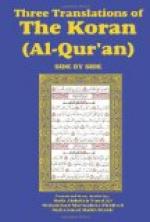6 For full information as to the clothing of the ancient Arabians see Freyt. Einl. pp. 295 327. The Koreisch (we are told in Sirat Arrasul, fol. 26, and Beidh.), in order to instil a deep respect for the Caaba and other holy places into the minds of the Arabians, had forbidden all food during the processions, and required that no clothes, except those borrowed from Meccans, should be worn, or that those who wore their own should devote them to God as holy vestments. The consequence was that most of the pilgrims visited the holy places in perfect nudity. Hence the precept in the text.
7 The Angels of Death.
8 Comp. Matth. xix. 24; Mark x. 25; Luke xviii. 25. By the change of a single vowel in the Arabic word for camel, we obtain the rendering, cable. In the Rabbinic form of the proverb, however, the elephant is substituted for the camel, which confirms the usual rendering and reading.
9 “On this wall (the name of which is derived from Arafa, ‘to know,’ with allusion to the employment of those upon it) will stand those whose good and evil works are equal, and are not, therefore, deserving of either Paradise or Gehenna. The idea, which is analogous to that of Purgatory, may be derived from the Talmud. Thus in the Midrasch on Eccl. vii. 14, ’How much space is there between the two’ (Paradise and Hell)? R. Jochanan saith, a wall; R. Acha, a span: others hold them to be so close that a person may see from one into the other.” See Plato’s Phaed. 62.
10 That is, they will know the inmates of Paradise by their whiteness, and the people of Hell by the blackness of their faces.
11 That is, ye believers: to whom the speakers on Al Araf are supposed to turn.
12 The fruits of Paradise. Comp. Luke xvi. 19.
13 The fulfilment of its promises and threats.
14 The rain. Thus, the Rabbins call the rain “the might and power of God,” Comp. Tract Tanith, fol. I, and connect it with the Resurrection, Tract Berachoth, fol. 33.
15 The Rabbins in like manner describe the mission of Noah. Comp. Sanhedr. 108. Midr. Rabbah on Gen. par. 30, 33; and on Eccl. 9, 14. See Sura [lxxv.] xi. 40.
16 The two tribes of Ad and Themoud-the latter of whom is mentioned by Diod. Sic. and Ptolemy-lay to the north of Mecca in the direct line of traffic between the countries to the north and to the south, and both probably disappeared with its cessation, when the Arabs were no longer held in check by the Romans. The traditions adopted by Muhammad attribute this to the divine vengeance, throughout the Koran, and were derived by him from the popular legends of Arabia. See Freyt. Einl. p. 12.
17 On Houd, see Geiger, pp. 113 119. He supposes him to be the Eber of the Bible. But Mr. Muir suggests that both Houd and Saleh may have been persecuted Jewish or Christian emissaries and teachers, whose rejection was thus recast by Muhammad. See note on verse 71.




